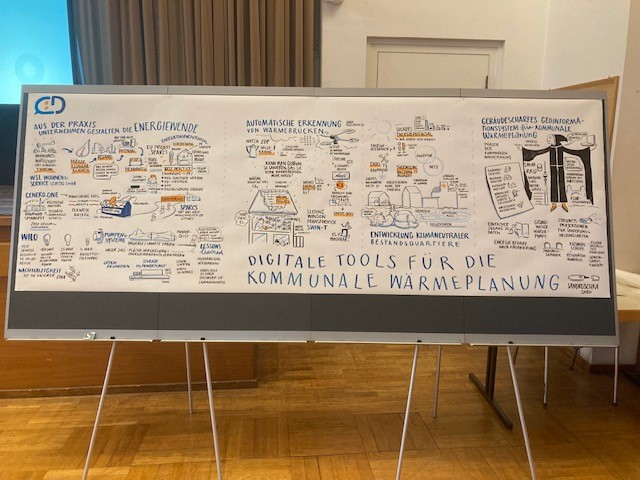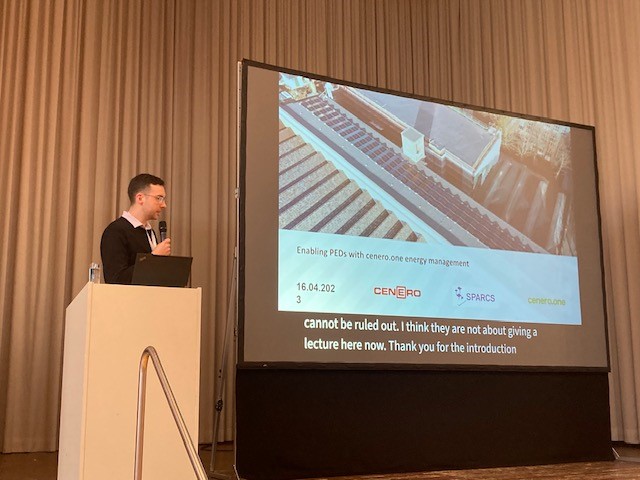Energy and Heat Planning Day during Leipzig Data Week 24
From 15-19 April 2024, a team consisting of the Digital City Unit of the city of Leipzig, Leipzig University and various IT companies hosted the third Data Week in Leipzig’s New Town Hall. In line with the motto Connecting people – using data, the data festival focussed in particular on the interface between the municipal sector and digital developments: instead of theory-focused scientific papers or arbitrary sales solutions, research results from applied sciences and demand-oriented business models from innovative companies were discussed. The second day of the Data Week in the Festsaal was dedicated entirely to the topic of energy and heat planning, which was covered in three sessions focussing on practical examples, digital tools and energy data, under the moderation of Julia Schließauf (Digital City Unit, City of Leipzig).
The first session, From the field – companies shaping the energy transition, discussed best practice examples at municipal level for achieving climate neutrality by 2040 in Leipzig and by 2045 at federal level. Specifically, this meant discussing the question of how the energy transition can take place in an existing residential area, in a listed industrial area and in a new industrial area so that it becomes a positive energy district (PED). The considerations were initiated by the contributions of Alexander Peitz (WSL), who used the example of the demo neighbourhood from the SPARCS project in his contribution “Smart solutions for energy-efficient buildings?!” to explain how a residential area can become a PED. This was followed by input from Richard Pankrath (cenero.one), who gave a presentation on “Enabling PEDs with cenero.one energy management”, in which a replicable energy management tool, developed as part of the SPARCS project, was presented that enables the transformation of such areas into PEDs. The first session ended with the presentation of a decentralised, renewable and self-sufficient H2 power plant energy supply system based on green hydrogen and a discussion about its benefits for companies.
The second session on digital tools for municipal heat planning focussed on existing (digital) energy transition and building concepts and discussed options such as the digital energy twin. The initial focus was on using drone images and AI for automated thermal bridge detection. In order to identify thermal bridges as weak points in buildings, images taken by drones with thermographic cameras were automatically analysed using deep learning. The subsequent presentation discussed how a seasonal shift in regenerative heating and cooling is possible in order to meet climate-related changes in demand by tapping into large storage masses in the form of near-surface geothermal energy. Finally, a representative of Stadtwerke München presented a building-specific geoinformation system, a so-called digital twin, for municipal heat planning.
The third and final session focussed on energy data for local authorities. The participants discussed the current data basis of municipalities and the question of how to obtain the data that municipalities need for planning. Firstly, an AI model was presented and discussed that could provide a solution to the existing data gap on the part of local authorities through efficient time series forecasting. The focus then lied on data infrastructures for municipalities, with particular emphasis on the importance of municipal data sovereignty and open source measures. The day dedicated to energy and heat planning ended with a presentation by a representative of Stadtwerke Leipzig, who showed how the business processes of Leipzig’s municipal utilities are being improved, in particular through the experimental use of deep learning models with regard to the efficiency and sustainability of district heating supply and through local large language models that facilitate the internal accessibility of complex content.
The entire Energy and Heat Planning Day can be accessed retrospectively on the official Data Week website here:
https://2024.dataweek.de/en/live/stream.html#!LXXKyxfLmjTtRTzzAc:matrix.org


